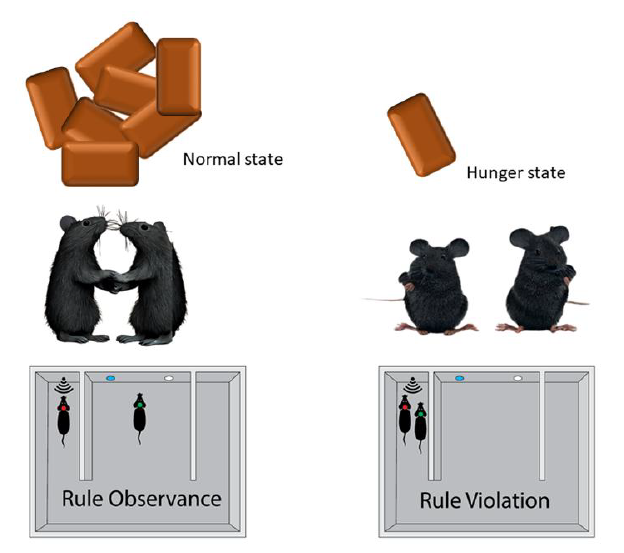Articles
Article Tools
Stats or Metrics
Article
Original Article
Exp Neurobiol 2023; 32(1): 31-41
Published online February 28, 2023
https://doi.org/10.5607/en22036
© The Korean Society for Brain and Neural Sciences
Negative Influence of the Hunger State on Rule-observance Behavior in Mice
Abdelrahman M. Alkahwaji1,2, Hee-Sup Shin1,2* and C. Justin Lee1,2*
1Center for Cognition and Sociality, Institute for Basic Science (IBS), Daejeon 34141, 2IBS School, University of Science and Technology, Daejeon 34141, Korea
Correspondence to: *To whom correspondence should be addressed.
Hee-Sup Shin, TEL: 82-42-878-9101, FAX: 82-42-878-9151
e-mail: shin@ibs.re.kr
C. Justin Lee, TEL: 82-42-878-9150, FAX: 82-42-878-9151
e-mail: cjl@ibs.re.kr
This is an Open Access article distributed under the terms of the Creative Commons Attribution Non-Commercial License (http://creativecommons.org/licenses/by-nc/4.0) which permits unrestricted non-commercial use, distribution, and reproduction in any medium, provided the original work is properly cited.
Abstract
Developing social strategies to share limited resources equally and maximize the long-term benefits of conflict resolution is critical for appropriate social interactions. During social interactions, social decision-making depends not only on the external environment, but also on internal factors, such as hunger, thirst, or fatigue. In particular, hunger, which is related to food as a physical need, plays a dominant role in social decision-making. However, the consequences of food deprivation on social decision-making are not well understood. We have previously shown that mice with rule-observance behavior are capable of resolving conflict during social decision-making by observing a well-established social strategy based on reward zone allocation. Here, we developed a rule-observance behavior paradigm wherein the hunger state is achieved by applying food restrictions on mice prior to social behavior experiments. We found that the hunger state in mice deteriorated the established social strategy by decreasing reaction time, implying an increase in impulsivity. In contrast, the hunger state did not affect reward zone allocation, indicating no effect on spatial memory. This decrease in reaction time led to a significant increase in the percentage of violations during rule observance and a significant decrease in the amount of reward (payoff equity). Our study proposes that the hunger state exerts a detrimental effect on appropriate social decision-making by decreasing reaction time, increasing violation, and decreasing payoff equity in rule-observance behavior.
Graphical Abstract

Keywords: Animal behavior, Hunger, Decision-making, Social behavior, Classical conditioning


